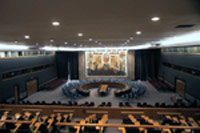
and human security

|
|

|
|

|
|

|
|

|
|

|
|

|
|
 |
|
 |
WCC UNITED NATIONS ADVOCACY WEEK FOCUS AREA: UN REFORM "We have come to a fork in the road. This may be a moment no less decisive than 1945 itself, when the United Nations was founded . . . I believe the time is ripe for a hard look at fundamental policy issues, and at the structural changes that may be needed in order to strengthen them. History is a harsh judge: it will not forgive us if we let this moment pass." |
 UN Security Council |
The WCC has had close working relationship with the UN secretariats in New York and Geneva since the signing of the UN charter. Through the WCC Commission of the Churches in International Affairs' (CCIA) consultative status, the WCC has made formal submissions and interventions to UN bodies and world conferences and helps churches and related groups to gain access to the UN. Through its work at the UN, the WCC helps promote effective global governance. It informs and encourages member churches and other movements, so that they can help improve the UN system and work with the UN as it seeks to be more responsive to the needs of people. The WCC relates to individual governments mainly through its member churches. Regular contacts are also maintained by the International Affairs staff with a number of governments, especially those who are members of the UN Security Council. The global fellowship of the WCC makes it one of the largest and most representative of the international NGOs accredited to the UN. It is certainly among those closest to local conditions affecting the lives of countless individuals. WCC delegations to UN world conferences and summits have often played important roles in broader civil society coalitions formed alongside the intergovern-mental gatherings in the hope of influencing their outcome. Kofi Annan, the UN secretary-general, has emphasized the need for major reforms in the United Nations system. In November 2003, a high-level commission of experts was appointed to make specific reform recommendations. WCC and CCIA, along with many other NGOs and international groups, advocate for a more representative, effective and universally respected UN. The WCC has always supported multilateral efforts for improving global governance and building peace. The UN should play a central role as a multilateral institution. Due to financial crisis and sharp political and practical divides, the organization requires reforms that would promote the original intentions of the UN Charter – to maintain international peace and security; to develop friendly relations among nations; to cooperate in solving international problems and in promoting respect for human rights; and to be a centre for harmonizing the actions of nations. Many international groups agree that the changes needed include:
Problematic structures mean that additional funding and other reforms will not likely be forthcoming until basic flaws in the present decision-making system are corrected. |
|